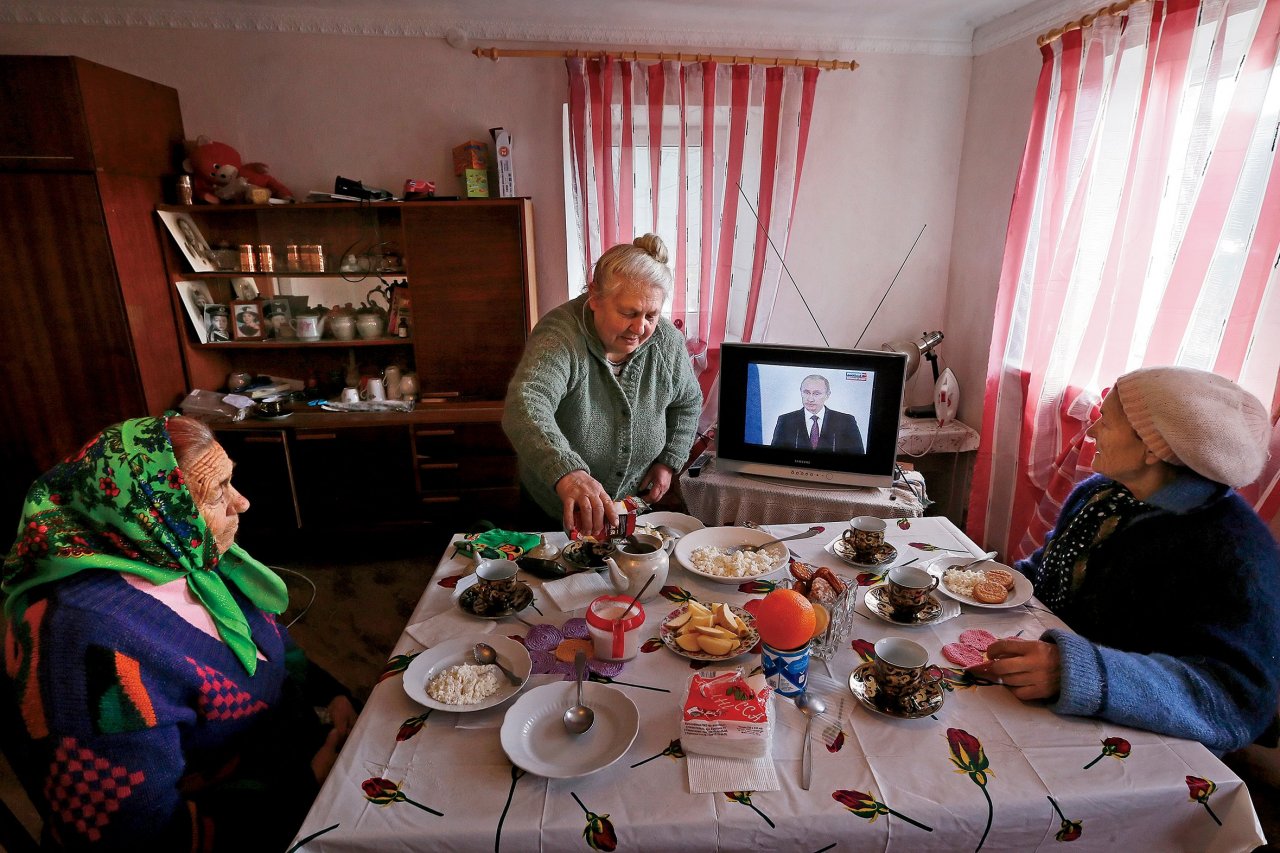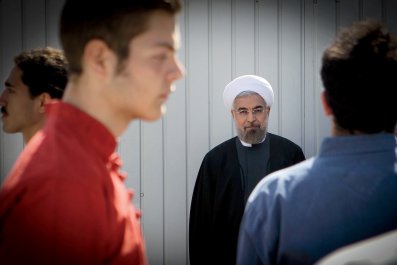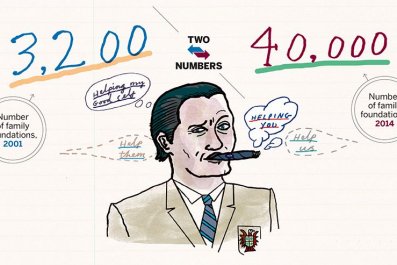The most public face of Russia's propaganda machine opened his show on May 18—as he does every Sunday at 8 p.m.—with what is now the standard fare: the civil war in Ukraine. The show is called News of the Week, and it airs on Russia 1, the state-owned network that is Russia's most popular. The show was devoted almost exclusively to the crisis in Ukraine—as it has been routinely since the autumn.
The host—a 60-year-old man with tightly cropped, receding gray hair—got straight into it, offering his by now predictable take on events. He condemned the Ukrainian army's effort to regain control of the eastern city of Sloviansk, a "punishing operation," he says, that could leave 650 dead or wounded (a figure, he cautions, that might be "difficult" to verify).
"Russia offered to have a three-sided discussion of the crises with Europe and Ukraine," he said, "but we received a rude answer: They will settle things on their own. The West blessed a state coup in Kiev, supported the coup in the media and with money, ignoring the victims, with fascists as the main force of the putsch, and finally ignoring the agreement signed in February."
Dmitry Konstantinovich Kiselev calls himself a journalist, and since last December, in addition to his weekly television duties, he heads the news service Rossiya Segodnya (Russia Today)—created by the Kremlin after the shutdown of its predecessor, RIA Novosti, which had been one of Russia's primary wire services. But television is the source of Kiselev's fame and influence, and on his program he is a showman, the carnival barker of an era—the "post-post Cold War era" that Putin is now busily creating—and his job is straightforward: Get Russians to view events in the way the Kremlin wants them to.
His tone, as he presides for just over an hour each Sunday, veers from bombastic to sarcastic to sneering, as he interviews correspondents in the field. Recent opinion polls say more than 80 percent of Russians approve of Putin's performance as president—a statistic that speaks powerfully to the fact that (rightly or wrongly) most Russians believe an era of weakness and subjugation to the West is now being reversed.
Kiselev surfs that chauvinistic, nationalistic wave, while at the same time helping to create it: News of the Week is one of the most popular shows on the network. He gets, on average, a 15 or 20 percent share of all sets turned on when his show airs—"Good ratings," he noted recently, "in any country."
He has become notorious in the West for homophobic slurs. Last year he said gays "should be prohibited from donating blood [or] sperm, and their hearts, in case they die in a car accident, should be buried or burned as unfit for extending anyone's life" in a transplant procedure. The comment earned him sanctions from the European Union, where he can no longer travel.
Undaunted, and more recently, he mocked Guido Westerwelle, Germany's former foreign minister, a gay man, and earlier this spring caused a ruckus by boasting that "Russia is the only country realistically capable of turning the United States into radioactive ash." (A popular blog post showed a Photoshopped picture of him being dragged away by men in white coats.)
But in recent months Ukraine has been almost the sole focus of Kiselev's attention. He relentlessly mocked the demonstrators in Kiev's Maidan Square and, since the ouster of Moscow-backed President Viktor Yanukovych, has been cheering on the slow-motion civil war Putin has been waging in eastern Ukraine, all the while castigating the new government in Kiev as merely a front for "anti-Semites" and "fascists"—a refrain heard constantly in the Russian media now.
Officially, at least, Kiselev is not Russia's propagandist-in-chief. That role is played by Putin's deputy chief of staff, Alexei Gromov, who calls in chief editors to coordinate the Kremlin line. Gromov distributes the orders to the mainstream media in Moscow, says Ilya Ponomarev, a Duma deputy from Novosibirsk, "and his orders are as strict as any in the army." But Kiselev is without question the public face of the party line.
Since the Russian Revolution, political propaganda has been central to Moscow's efforts to control (and subjugate) the vast country. During the three-year-long civil war, Red Army divisions were equipped with printing presses that turned out posters and newspapers, and "propaganda trains" constantly toured the front. The goal, wrote Richard Pipes in Russia Under the Bolshevik Regime, was to "instill in the troops the conviction that the Red Army was invincible," though whether it "succeeded in creating the desired state of mass hypnosis is questionable."
Kiselev would never say that his goal is to create a modern-day "state of mass hypnosis." Indeed, he denies being a propagandist at all. He is, in his telling, a journalist practicing his craft in a country that values and allows free speech. In a recent opinion piece for London's Guardian—written after he was targeted for sanctions by the European Union—Kiselev, with typical brio, argued that East and West appeared to "be trading places. In Russia we now take full advantage of freedom of speech, whereas in the West political correctness, or political expediency in the name of security, have become arguments against freedom of speech. By sanctioning me, the EU has sanctioned freedom of speech," he wrote.
After graduating with a degree in Scandinavian languages from Leningrad State University, Kiselev worked as a television journalist during the Soviet era. In those days, journalists knew they were simply serving up propaganda for the state. Many didn't believe much of what they had to report. That began to change during the era of glasnost, in the last years of the Soviet Union. One of the people trying to test the limits in that era was Oleg Dobrodeev. Today, Dobrodeev is chairman of the All Russia State Television and Radio Broadcasting Co., overseeing all the programming on Kiselev's network—and he takes his orders directly from the Kremlin.
Whether he comes to his current, full-throated support for Putin's "New Russia" honestly or cravenly is not clear. Opposition lawmaker Ponomarev, for one, believes what he sees and hears when he watches Kiselev on television.
"Men like Kiselev and many others sincerely believe they are soldiers fighting fascism [in Ukraine] in an information war," he says. "He publicly says that the time of objective and civil journalism has gone," and that, Ponomarev believes, is a reflection of Putinism. "It's Vladimir Putin's life philosophy. The president believes that independent social opinion does not exist, that social opinion is shaped by state media."
Kiselev, as a vehicle for Russia's propaganda, is undeniably having an impact, which is why there will undoubtedly be lots more of it to come. "We always had propaganda in Russia," says Mikhail Zygar, the director of Rain TV, an independent network that lost its right to broadcast earlier this year, "but for the first time it's very effective. Both the Kremlin's politics and its propaganda are giving people something they had missed for decades, a feeling of pride."
























